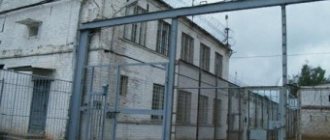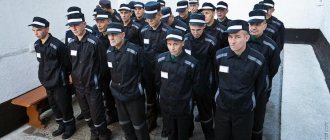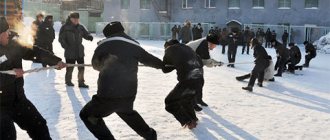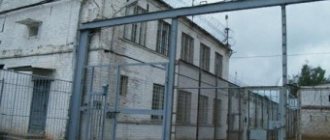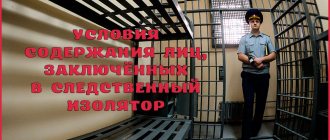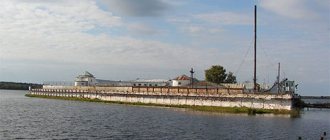The concept of a maximum security colony. Who is contained in them?
A maximum security colony is one of the most stringent closed-type correctional institutions, where persons who are the most socially dangerous to citizens and society as a whole are serving their sentences based on a court verdict, and therefore require strict isolation. Such especially dangerous citizens, as a rule, end up there for committing serious or especially serious intentional crimes, for example, the intentional murder of two or more persons, contract killing, or especially dangerous recidivism. The conditions of detention in such a correctional institution as a maximum security colony are quite strict and severe, which is manifested in a large number of restrictions and complete isolation.
Why do they give strict regime?
To better understand what a strict detention regime is like, it is worth considering all types of colonies and the severity of the offenses for which criminals end up in one or another penitentiary institution.
In the Russian penal system, in addition to prisons (pre-trial detention centers) and educational institutions, there are four types of colonies :
- settlements;
- general regime;
- strict regime;
- special regime.
Colonial settlements house those convicted of unintentional offenses and crimes of medium and minor gravity that were committed for the first time. These institutions have the softest regime: there are no camp towers or armed guards; convicts have the opportunity to walk throughout the entire camp at any time and even leave its boundaries with the permission of the administration.
The type of colony with a general regime is one of the most common for several reasons.
- Firstly , the court sends both women and men here.
- Secondly , the range of articles under which people are sent to these institutions is quite wide (in most cases these are serious offenses committed for the first time).
- Thirdly , troublemakers from colony settlements can be transferred here.
Only men serve their sentences in strict and special regime correctional institutions. Women, even those convicted of particularly serious offenses, are placed in general regime camps or in separate women's prisons.
In maximum security correctional institutions, persons serve sentences for especially serious crimes that have been committed for the first time. Also, those convicted of repeated atrocities who were declared dangerous by the court are sent here.
The special regime is the toughest in terms of keeping prisoners. Those sentenced to life imprisonment and repeat offenders on especially serious charges are held here.
Note. The Russian prison department has 716 penitentiary institutions. These include 126 colony settlements, 24 colonies for teenagers, 6 prisons intended for prisoners sentenced to life.
Internal structure of the colony
The maximum security correctional colony is divided into a residential area and industrial premises. In turn, the residential area can contain several local ones: a dining room, a library, a medical unit with an infirmary, a bathhouse, as well as a headquarters where the offices of administrative workers are located. Convicts are kept in locked cells designed for 30-50 people. They have beds in two or three tiers; the standard area per person is 7 m², which, however, is often violated. On the territory of the colony there is always a small area for walking in the fresh air, as well as a room for disciplinary punishments or a punishment cell (punishment cell), where prisoners are placed for violating the order.
What is the difference between strict regime and general regime?
If, for example, in a colony-settlement you can visit a neighboring dormitory and move freely throughout the entire territory, then in a high-security prison, walks are rationed, and at night prisoners are locked in a common cell.
It is clear that the severity of the crime determines the punishment and the place where a particular criminal will serve it. However, in each camp there are also internal regimes that the convict can “earn.” These modes can be:
- lightened;
- ordinary (general);
- strict.
It is worth starting to consider the differences between a general and strict regime penitentiary institution with the conditions that are established in them by default. Under normal conditions, the following restrictions are defined for a general regime camp:
- spend up to 3 minimum wages per month on personal needs, in addition to earnings;
- 6 short-term and 4 long-term dates per year;
- 6 parcels or parcels and 6 parcels per year;
- walks are limited only by daily routine and work.
Standard conditions for a maximum security colony:
- You can spend no more than 2 minimum wages per month, in addition to the money earned in the colony;
- 3 short-term and 3 long-term dates per year;
- 4 parcels and 4 parcels per year;
- walks are not prohibited or limited in time.
Even a cursory glance shows that the conditions of detention in maximum security colonies are one and a half times harsher.
But even the most “inveterate” convict can deserve relief. In order for the administration to transfer a convicted person to lighter conditions, it is enough not to violate the established rules and work diligently.
In light conditions in a general regime colony, restrictions on spending money per month are completely lifted, the number of long-term visits increases to 6, and the number of parcels and parcels that can be received per year increases by 2 times - you can receive up to 12 parcels.
Facilitated conditions in a maximum security penal colony almost completely replicate the standard rules for keeping prisoners in general security camps.
Thus, under relaxed conditions, a convicted person can spend 3 minimum wages, the number of both short-term and long-term visits increases to 4, and the number of permitted parcels and parcels increases to 6 per year.
Reference. According to the law, a convicted person placed in a high-security correctional facility must first serve at least 9 months under general conditions. If, after this period, there are no penalties from the administration against the convicted person and he has conscientiously performed his duties, he is transferred to lighter conditions.
In contrast to the lighter ones, there are also strict conditions. Under strict conditions, the convict stays in a locked room and has the right to walk for an hour and a half - these conditions are the same for both colonies.
The changes are most significant for general regime colonies. Here the conditions of detention are tightened 3-4 times. A convicted person can spend only 2 minimum wages per month on himself, and only 2 meetings with relatives, 3 parcels and the same number of parcels are allowed per year.
Compared to ordinary conditions, the strict conditions in a maximum security colony worsen the situation of the convicted person by approximately 2 times . The convicted person is allowed to spend only one minimum salary per month (about 11 thousand rubles). There are several meetings with family and friends per year: 1 long and 2 short-term. Allowed to receive 2 parcels and 2 parcels.
Peculiarities of keeping women in colonies
As a rule, the word “prisoner” or “convict” is associated with a middle-aged man with a rough voice, speaking in obscene language, who has several convictions behind him, usually “for hooliganism” or “drug use.” But increasingly, the concept of “convict” refers to girls, women who are genetically programmed to be a mother. However, this does not stop them from committing heinous crimes. Thus, the most common crimes among the fair half of humanity are the sale, storage, production of narcotic substances, unintentional murder, and hooliganism.
On the same grounds as for men, namely for committing serious, especially serious crimes, the court can sentence a woman to serve her sentence in a maximum security colony for women, which is not much different from that for men. The conditions for staying in such a colony were created without taking into account the physiological, psychological and other characteristics of the female body. In such an institution, a woman, as a rule, loses social adaptation without moral and financial support, that is, there is almost no opportunity to adapt to life in the wild.
For a woman, imprisonment is much more painful than for a man. This is due to the distance from home, relatives, husband, children, lack of sanitary and hygienic conditions, psychological difficulties of the regime of serving a sentence (lack of personal belongings, uniform uniform, marching in formation). A maximum security women's colony is subject to the same regime requirements: the same number of permissible parcels and visits, work in any type of work is possible, the same disciplinary punishments, including serving them in a punishment cell. It should be noted that men, like women, having spent an average of three to five years in a colony, get used to prison life, so often, after being released, they end up back in prison. Although this does not mean at all that women who have been in the colony are, of course, “the dregs of society,” among them there are often gifted, talented craftswomen and artists.
The State Duma proposed imprisonment for up to 15 years for fakes about the Armed Forces of the Russian Federation
https://www.znak.com/2022-03-02/v_gosdume_predlozhili_sazhat_v_tyurmu_na_srok_do_15_let_za_feyki_o_vooruzhennyh_silah_rf 2022.03.02
The State Duma proposed amending the Criminal Code to punish up to 15 years in prison for spreading fakes about the actions of the Russian Armed Forces. This was stated today by United Russia deputy Vasily Piskarev.
“[A] huge number of fakes have appeared, discrediting our Armed Forces, which came to Ukraine to end the war that was unleashed by the leadership of Ukraine. We must protect our Armed Forces. And so everything has been distorted, and fakes are spreading all over the Internet and media, we need to put an end to this,” Piskarev explained.
According to United Russia, people who spread fake news about the Russian military should be punished “in the most severe way.” And the amendment “will allow us to protect our guys” participating in the special operation in Ukraine, Piskarev believes.
The proposed amendment to the Criminal Code of the Russian Federation consists of three parts:
- Simply producing fakes is punishable by up to 3 years
in prison. - If the dissemination of a fake occurs using an official position, the Internet, or a group of people, then the term of imprisonment can be up to 10 years.
- If socially dangerous consequences occur as a result of the spread of a fake, the person who produced the fake faces up to 15 years
in prison.
Let us note that Vasily Piskarev proposes to introduce an amendment to the bill, which was submitted to the State Duma for consideration back in 2018. We are talking about bill No. 464757-7, aimed at implementing “measures to influence unfriendly actions of the United States and foreign countries.”
The text of the law talks about the introduction of criminal liability - imprisonment for a term of up to 4 years - for the commission of actions in order to execute a decision of a foreign state, a union of foreign states on the introduction of restrictive measures, if these actions entailed a restriction or even a refusal to commit Russian citizens, legal entities , registered in the Russian Federation, subjects of the Russian Federation <…> ordinary business transactions or transactions.
The document also proposes imprisonment in a colony for a term of up to 3 years for a citizen of the Russian Federation committing deliberate actions that contribute to the introduction by a foreign state <…> of restrictive measures in relation to Russian private and public entities, as well as persons controlled by them, including through the provision of recommendations and the transfer of information that led or could lead to the introduction of restrictive measures against Russian private and public entities, as well as persons controlled by them.
According to the legislative support system, this bill was adopted in the first reading back in 2018. Since then, deputies have not returned to study it.
The government wants to expand the scope of the “Dima Yakovlev Law”. What will change?
The authors of the draft law were Vyacheslav Volodin, Gennady Zyuganov, Vladimir Zhirinovsky, Sergei Mironov, Sergei Neverov, Alexander Zhukov and Valentina Matvienko.
On February 24, Russian President Vladimir Putin announced the start of a special military operation in Ukraine. Its goal is the demilitarization and denazification of Ukraine, the protection of people in Donbass who are “subject to genocide.” The Verkhovna Rada of Ukraine approved the introduction of martial law in the country, and general mobilization was announced. A curfew has been introduced in Kyiv.
There are protracted battles in Ukraine. There is no exact data on the number of dead and injured. Western countries have imposed strict sanctions against Russia, in particular, the airspace in Europe is completely closed to Russian aircraft, restrictions prohibit operations with the reserves and assets of the Bank of Russia.


